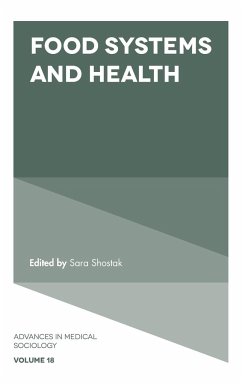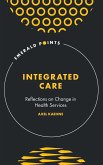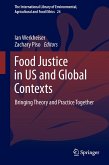Food Systems and Health
Herausgeber: Shostak, Sara; Perry, Brea L.
Food Systems and Health
Herausgeber: Shostak, Sara; Perry, Brea L.
- Gebundenes Buch
- Merkliste
- Auf die Merkliste
- Bewerten Bewerten
- Teilen
- Produkt teilen
- Produkterinnerung
- Produkterinnerung
Volume 18 of Advances in Medical Sociology brings cutting-edge sociological research to bear on these multiple dimensions of food systems and their impacts on individual and population health. This volume highlights how food systems matter for health policy, health politics, the lived experiences and life chances of individuals and communities.
Andere Kunden interessierten sich auch für
![Environmental Exposures and Human Health Challenges Environmental Exposures and Human Health Challenges]() Environmental Exposures and Human Health Challenges300,99 €
Environmental Exposures and Human Health Challenges300,99 €![Integrated Care Integrated Care]() Axel KaehneIntegrated Care73,99 €
Axel KaehneIntegrated Care73,99 €![Food Justice in US and Global Contexts Food Justice in US and Global Contexts]() Food Justice in US and Global Contexts97,99 €
Food Justice in US and Global Contexts97,99 €![Assessment of hygienic practices and microbiological quality of food Assessment of hygienic practices and microbiological quality of food]() Aisha Idris AliAssessment of hygienic practices and microbiological quality of food26,99 €
Aisha Idris AliAssessment of hygienic practices and microbiological quality of food26,99 €![Food Hygiene and Applied Food Microbiology in an Anthropological Cross Cultural Perspective Food Hygiene and Applied Food Microbiology in an Anthropological Cross Cultural Perspective]() Aleardo ZaccheoFood Hygiene and Applied Food Microbiology in an Anthropological Cross Cultural Perspective75,99 €
Aleardo ZaccheoFood Hygiene and Applied Food Microbiology in an Anthropological Cross Cultural Perspective75,99 €![Emerging Trends and Innovations in Privacy and Health Information Management Emerging Trends and Innovations in Privacy and Health Information Management]() Emerging Trends and Innovations in Privacy and Health Information Management289,99 €
Emerging Trends and Innovations in Privacy and Health Information Management289,99 €![Management of Health Risks from Environment and Food Management of Health Risks from Environment and Food]() Hajime Sato (Hrsg.)Management of Health Risks from Environment and Food112,99 €
Hajime Sato (Hrsg.)Management of Health Risks from Environment and Food112,99 €-
-
-
Volume 18 of Advances in Medical Sociology brings cutting-edge sociological research to bear on these multiple dimensions of food systems and their impacts on individual and population health. This volume highlights how food systems matter for health policy, health politics, the lived experiences and life chances of individuals and communities.
Hinweis: Dieser Artikel kann nur an eine deutsche Lieferadresse ausgeliefert werden.
Hinweis: Dieser Artikel kann nur an eine deutsche Lieferadresse ausgeliefert werden.
Produktdetails
- Produktdetails
- Verlag: Emerald Publishing Limited
- Seitenzahl: 278
- Erscheinungstermin: 13. Juli 2017
- Englisch
- Abmessung: 235mm x 157mm x 20mm
- Gewicht: 557g
- ISBN-13: 9781786350923
- ISBN-10: 1786350920
- Artikelnr.: 46603582
- Herstellerkennzeichnung
- Libri GmbH
- Europaallee 1
- 36244 Bad Hersfeld
- gpsr@libri.de
- Verlag: Emerald Publishing Limited
- Seitenzahl: 278
- Erscheinungstermin: 13. Juli 2017
- Englisch
- Abmessung: 235mm x 157mm x 20mm
- Gewicht: 557g
- ISBN-13: 9781786350923
- ISBN-10: 1786350920
- Artikelnr.: 46603582
- Herstellerkennzeichnung
- Libri GmbH
- Europaallee 1
- 36244 Bad Hersfeld
- gpsr@libri.de
Sara Shostak is Associate Professor of Sociology and Chair of the Health: Science, Society, and Policy (HSSP) Program at Brandeis University. Her research and teaching interests encompass medical sociology, science and technology studies, and environmental sociology. Across these domains, Shostak focuses on how to understand - and address - inequalities in health. Shostak's first book - Exposed Science: Genes, the Environment, and the Politics of Population Health (University of California Press, 2013) - won the Robert K. Merton Book Award from the American Sociology Association's Section on Science, Knowledge and Technology and the Eliot Freidson Outstanding Publication Award from the Medical Sociology Section. Shostak's current book project is a study of urban agriculture in New England cities; as part of this work, she has collaborated on community based research projects with The Urban Farming Institute of Boston, The Food Project, and Groundwork Somerville. Hannah R. Andrews is a doctoral student in the School of Sociology at the University of Arizona. Her research focuses on the impact of differences in social condition on health status. She is also interested in the influence of technological changes in health care on the work experience of health care workers as well as patient outcomes. Christy Freadreacea Brady received her PhD in Sociology from the University of Kentucky. She is a Lecturer in the department of Health Management and Policy in the College of Public Health at the University of Kentucky. Her research interests include medical sociology, obesity stigma, and health policy and inequality. She teaches courses on the health care system, current issues in health and health policy, and inequality and health. Robyn Lewis Brown is an Associate Professor of Sociology at the University of Kentucky, where she also serves as chair of the undergraduate Health, Society and Populations program. Her work emphasizes gender differences in experiences of health, illness, and disability, and frames both gender and disability as fundamental sources of social and economic inequality. Jessica McCrory Calarco is an Assistant Professor of Sociology at Indiana University. Her research and teaching focus on issues related to education, family, culture, stratification, and qualitative methods. In particular, Calarco is interested in understanding inequalities in the lives of children and youth. Calarco's research has been published in the American Sociological Review, the American Educational Research Journal, and Social Psychology Quarterly. Her current book project (under contract with Oxford University Press) examines how middle-class children and parents secure unequal (and often unfair) advantages in school. Gabriele Ciciurkaite joined the department of Sociology, Social Work and Anthropology at Utah State University in 2016 after completing her PhD in Sociology at the University of Kentucky. Gabriele is a medical sociologist with research expertise in the social determinants of health, social stratification and quantitative methods. Her recent interdisciplinary work informs public health efforts to disparities. Her current research focuses in two primary areas: (1) the intersection of gender, race and socioeconomic status and the ways these social factors create and sustain health disparities and (2) chronic illness prevention and management among vulnerable populations. Her work has been published widely in interdisciplinary and applied academic journals. William C. Cockerham is Distinguished Professor and Chair of the Department of Sociology at the University of Alabama at Birmingham. He currently is Co-Leader of the Social Determinants of Health Measurement Core of the Mid-South Transdisciplinary Collaborative Center for Health Disparities Research funded by the National Institute on Minority Health and Health Disparities. His most recent publications include co-editorship of a special issue of the American Journal of Preventive Medicine (2017) on the social determinants of health, associate editor-in-chief of the International Encyclopedia of Public Health (Academic Press, 2017) and two books, the Sociology of Mental Disorder, 10th ed. (Routledge, 2017) and Medical Sociology , 14th ed. (Routledge, 2017). Ashley Colby is a PhD candidate focusing on environmental sociology at Washington State University. Her dissertation research is on subsistence food production in Chicago as part of a pluralistic, horizontal and amorphous social movement to innovate and adapt to both a post-capitalist future as well as a future of increasing environmental crises. Ashley got her MA in sociology at WSU in 2013, and her BA in Cinema and Media Studies at the University of Chicago in 2007. She has travelled to over 30 countries on 5 continents. Combining her experiences in travel and education, Ashley has co-founded Rizoma Field School in Colonia, Uruguay which focuses on identifying and addressing both environmental social problems as well as resilient alternatives that are emerging in response. Gabriel Blouin Genest is an Assistant Professor at the department of Political Science, Virginia tech. Dr. Blouin-Genest teaches courses in global governance and public policy. His research interests include health politics and policies, health security and pandemics, global health institutions and practices, water and food politics as well as the complexity theory. His work has been published in Health: An Interdisciplinary Journal for the Social Study of Health, Illness and Medicine, The Journal of Human Right and the Environment, Health Policy and Technology, SociologieS, and Cultures & Conflits. Gabriel is also the author of L'eau en commun (PUQ, 2012) as well as several chapters published (or in the process to be) at Peter Lang, UBC Press and Athéna Press. Norris Guscott received his B.A in Psychology from The University of Massachusetts: Boston and is a Harvard-affiliated clinical/social science researcher working with several Harvard teaching hospitals and Boston area non-profit organizations. In addition to his research, Guscott served low-SES communities for a year through a hybrid Americorps program called Foodcorps (which sought to address childhood obesity and community food access issues by utilizing community and school gardens). Through Foodcorps, he was able to travel to the White House garden to discuss food issues under Michelle Obama's Let's Move campaign. Currently, he is a community outreach/research consultant with The Food Project and sits on the board of an educational non-profit organization called Project Mayhems Inc. Terrence D. Hill is an associate professor in the School of Sociology and a Scientific Member of the Arizona Center on Aging at the University of Arizona. His research examines the social distribution of health and health-relevant behaviors. He is especially interested in the effects of religious involvement, neighborhood context, social relationships, and socioeconomic status. His publications appear in a range of journals, including the Journal of Health and Social Behavior, Social Science & Medicine, Society and Mental Health, Journals of Gerontology, American Journal of Public Health, and Social Work. He has also recently published chapters in the Handbook of Sociology of Aging, Annual Review of Gerontology and Geriatrics, and the Handbook of the Sociology of Mental Health. Emily Huddart Kennedy is Assistant Professor of Sociology at Washington State University. Her research and teaching interests are focused on environmental sociology, more specifically, on civic engagement in environmental protection and sustainability. Kennedy has studied low-impact households, leaders in the local food movement, and food producers to understand what motivates pro-environmental activity and who feels included and excluded from such efforts. Kennedy first book (co-authored with Maurie Cohen and Naomi Krogman) - Putting Sustainability into Practice (Edward Elgar Publishing) is an edited collection of research using social practice theories to advance the study of sustainable consumption. Kennedy's current research involves better understanding the conditions under which sustainable consumption practices exacerbate boundaries related to gender and class. Amy Jonason is an assistant professor of sociology at Furman University in Greenville, SC. Her research investigates how citizens collaborate to solve social problems in the postindustrial urban landscape. Her current project tracks the development and change of two alternative food projects - an urban food cooperative and an urban farm - as a response to perceptions of food insecurity in inner-city neighborhoods. Her co-authored research has appeared in Symbolic Interaction, Poetics, and City & Society. Brea L. Perry is an Associate Professor of Sociology and an affiliated faculty of the Indiana University Network Science Institute at Indiana University, Bloomington. Her research focuses on the intersections of social networks, medical sociology, biosociology, and social inequalities. Her current NIH-funded projects investigate social network indicators of prescription drug seeking behavior, the role of personal social networks in neurodegeneration and older adults' cognitive decline, and the coevolution of recent Mexican immigrants' social networks and oral health attitudes, behaviors, and outcomes. Jeffery Sobal is a Professor in the Division of Nutritional Sciences and Fields of Development Sociology, Demography, and Epidemiology at Cornell University. His research focuses on the construction, interpretation, and social patterns of body weight, food choice, food systems, gender and food, and commensal eating. He has published a many of articles in sociology, health, and nutrition journals, contributed a number of chapters to edited books, and with Donna Maurer he co-edited the books Eating Agendas (1995), Weighty Issues (1999), and Interpreting Weight (1999). He is currently working on the construction of food choice and examining how the social sciences deal with food. Jane VanHeuvelen is a lecturer at the University of Illinois Urbana-Champaign. Her research is in areas of medical sociology, mental health and illness, and medical organizations. In her current research, she focuses primarily on bridging organizational and cultural theories of practice, status, and social interaction into the medical professions. She used mixed methods in her dissertation to examine how medical professionals responded to the physical restructuring of a neonatal intensive care unit. Tom VanHeuvelen is an Assistant Professor in the Department of Sociology at the University of Illinois at Urbana-Champaign. His research primarily focuses on inequality, social stratification, comparative and historical sociology, and the sociology of development.
Introduction: Towards a Sociology of Food Systems and Population Health -
Sara Shostak
Part 1 - Food Systems and Health Outcomes
Chapter 1 - Food System Channels, Health and Illness - Jeffery Sobal
Chapter 2 - Rich Foods: The Cross-National Effects of Healthy Eating on
Health Outcomes - Jane S. van Heuvelen and Tom van Heuvelen
Chapter 3 - Food Insecurity and Mental Health: A Gendered Issue? - Gabriele
Ciciurkaite and Robyn Lewis Brown
Part 2 The Social Determinants of Consumption
Chapter 4 - Food Priorities: Sociodemographic Variation in Constrained
Choices at the Grocery Store - Christy Freadreacea Brady
Chapter 5 - Educational Attainment and Dietary Lifestyles - Hannah Andrews,
Terrence D. Hill and William C. Cockerham
Chapter 6 - Let them eat cake: Socioeconomic status and caregiver
indulgence of children's food and drink requests - Brea L. Perry and
Jessica McCrory Calarco
Part 3 - Alternative Food Institutions and Ideologies
Chapter 7 - The Promises and Pitfalls of Alternative Food Institutions:
Impacts on and Barriers to Engagement with Low-Income Persons in the United
States and Canada - Amy Jonason
Chapter 8 - Extension of What and to Whom? A Qualitative Study of
Self-Provisioning Service Delivery in a University Extension Program -
Ashley Colby and Emily Huddart Kennedy
Chapter 9 - "Grounded in the Neighborhood, Grounded in Community¿: Social
Capital and Health in Community Gardens -
Sara Shostak and Norris Guscott
Chapter 10 - Reclaiming Policy Imagination: Buen Vivir, policy culture, and
the policy divide between health and agriculture in Puerto Rico - Gabriel
Blouin Genest
Sara Shostak
Part 1 - Food Systems and Health Outcomes
Chapter 1 - Food System Channels, Health and Illness - Jeffery Sobal
Chapter 2 - Rich Foods: The Cross-National Effects of Healthy Eating on
Health Outcomes - Jane S. van Heuvelen and Tom van Heuvelen
Chapter 3 - Food Insecurity and Mental Health: A Gendered Issue? - Gabriele
Ciciurkaite and Robyn Lewis Brown
Part 2 The Social Determinants of Consumption
Chapter 4 - Food Priorities: Sociodemographic Variation in Constrained
Choices at the Grocery Store - Christy Freadreacea Brady
Chapter 5 - Educational Attainment and Dietary Lifestyles - Hannah Andrews,
Terrence D. Hill and William C. Cockerham
Chapter 6 - Let them eat cake: Socioeconomic status and caregiver
indulgence of children's food and drink requests - Brea L. Perry and
Jessica McCrory Calarco
Part 3 - Alternative Food Institutions and Ideologies
Chapter 7 - The Promises and Pitfalls of Alternative Food Institutions:
Impacts on and Barriers to Engagement with Low-Income Persons in the United
States and Canada - Amy Jonason
Chapter 8 - Extension of What and to Whom? A Qualitative Study of
Self-Provisioning Service Delivery in a University Extension Program -
Ashley Colby and Emily Huddart Kennedy
Chapter 9 - "Grounded in the Neighborhood, Grounded in Community¿: Social
Capital and Health in Community Gardens -
Sara Shostak and Norris Guscott
Chapter 10 - Reclaiming Policy Imagination: Buen Vivir, policy culture, and
the policy divide between health and agriculture in Puerto Rico - Gabriel
Blouin Genest
Introduction: Towards a Sociology of Food Systems and Population Health -
Sara Shostak
Part 1 - Food Systems and Health Outcomes
Chapter 1 - Food System Channels, Health and Illness - Jeffery Sobal
Chapter 2 - Rich Foods: The Cross-National Effects of Healthy Eating on
Health Outcomes - Jane S. van Heuvelen and Tom van Heuvelen
Chapter 3 - Food Insecurity and Mental Health: A Gendered Issue? - Gabriele
Ciciurkaite and Robyn Lewis Brown
Part 2 The Social Determinants of Consumption
Chapter 4 - Food Priorities: Sociodemographic Variation in Constrained
Choices at the Grocery Store - Christy Freadreacea Brady
Chapter 5 - Educational Attainment and Dietary Lifestyles - Hannah Andrews,
Terrence D. Hill and William C. Cockerham
Chapter 6 - Let them eat cake: Socioeconomic status and caregiver
indulgence of children's food and drink requests - Brea L. Perry and
Jessica McCrory Calarco
Part 3 - Alternative Food Institutions and Ideologies
Chapter 7 - The Promises and Pitfalls of Alternative Food Institutions:
Impacts on and Barriers to Engagement with Low-Income Persons in the United
States and Canada - Amy Jonason
Chapter 8 - Extension of What and to Whom? A Qualitative Study of
Self-Provisioning Service Delivery in a University Extension Program -
Ashley Colby and Emily Huddart Kennedy
Chapter 9 - "Grounded in the Neighborhood, Grounded in Community¿: Social
Capital and Health in Community Gardens -
Sara Shostak and Norris Guscott
Chapter 10 - Reclaiming Policy Imagination: Buen Vivir, policy culture, and
the policy divide between health and agriculture in Puerto Rico - Gabriel
Blouin Genest
Sara Shostak
Part 1 - Food Systems and Health Outcomes
Chapter 1 - Food System Channels, Health and Illness - Jeffery Sobal
Chapter 2 - Rich Foods: The Cross-National Effects of Healthy Eating on
Health Outcomes - Jane S. van Heuvelen and Tom van Heuvelen
Chapter 3 - Food Insecurity and Mental Health: A Gendered Issue? - Gabriele
Ciciurkaite and Robyn Lewis Brown
Part 2 The Social Determinants of Consumption
Chapter 4 - Food Priorities: Sociodemographic Variation in Constrained
Choices at the Grocery Store - Christy Freadreacea Brady
Chapter 5 - Educational Attainment and Dietary Lifestyles - Hannah Andrews,
Terrence D. Hill and William C. Cockerham
Chapter 6 - Let them eat cake: Socioeconomic status and caregiver
indulgence of children's food and drink requests - Brea L. Perry and
Jessica McCrory Calarco
Part 3 - Alternative Food Institutions and Ideologies
Chapter 7 - The Promises and Pitfalls of Alternative Food Institutions:
Impacts on and Barriers to Engagement with Low-Income Persons in the United
States and Canada - Amy Jonason
Chapter 8 - Extension of What and to Whom? A Qualitative Study of
Self-Provisioning Service Delivery in a University Extension Program -
Ashley Colby and Emily Huddart Kennedy
Chapter 9 - "Grounded in the Neighborhood, Grounded in Community¿: Social
Capital and Health in Community Gardens -
Sara Shostak and Norris Guscott
Chapter 10 - Reclaiming Policy Imagination: Buen Vivir, policy culture, and
the policy divide between health and agriculture in Puerto Rico - Gabriel
Blouin Genest








